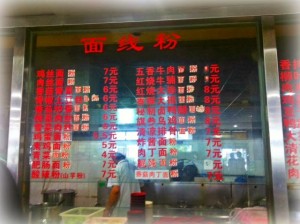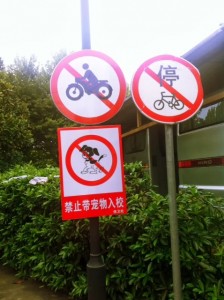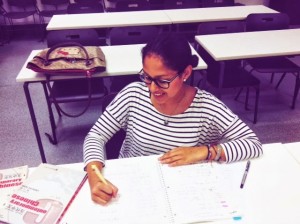 Mandarin is one of the most challenging languages out there; at least for me. It has been a total adventure trying to cope with the language barrier here in Shanghai. Although this city does offer most of its traffic and business signs in both Chinese and English, when dealing one-on-one with most of the locals I still manage to get lost in translation.
Mandarin is one of the most challenging languages out there; at least for me. It has been a total adventure trying to cope with the language barrier here in Shanghai. Although this city does offer most of its traffic and business signs in both Chinese and English, when dealing one-on-one with most of the locals I still manage to get lost in translation.
I am currently taking a Chinese class as part of my CEA study abroad program in Shanghai, and it has helped me a whole lot, but I think the best way to put into practice what you learn in the classroom is to go out and talk to people. Or if you are too intimidated to talk, just listen and sooner or later you will start to pick up a few words here or there.
One of the few challenges here has been trying to order food from restaurants, as most of them have their menus written in Chinese only. If I absolutely cannot understand anything on the menu and if I get lucky enough to have a menu with pictures, I will just point at whatever looks appealing to me, and somehow the waiter will understand what I want. It seems to work this way for most international people here in the city that don't know the language. Although, if pictures are not always available, hand signals are the best way to communicate if you are having a hard time getting your point across. And do not worry, most Chinese people will be understanding and friendly and will try to cooperate with you.
Another challenge that I have faced because of the language barrier is grocery shopping. Trying to
find certain products that you’re are used to back home such as low sodium salt, cheese, sausages, hams, peanut butter or even cereal can be challenging. Most of the labels are in Chinese, or you don't know how to ask where the products are, or they might not even carry the item in the store.



But not everything has been challenging. I have been able to learn a lot during my stay here in
Shanghai, and I try to surround myself with Chinese students on campus who are willing to teach me new words every day. Also, my roommate and I have placed sticky notes all over our room, which label each object with its Chinese name, such as door, window, light, bed etc. This way I can learn basic everyday words faster.

Another huge aid in my learning process has been my Chinese teacher. She has been very helpful and patient; she manages to keep our class interesting yet challenging allowing us to give our full potential and learn as much as we can. In addition to that, our program has provided us with a Chinese tutor who meets with us privately once a week.

All of these things have allowed me to develop a quick learning technique, which hopefully will help me to fully learn the language very soon.

Katherine Guevara is the Fall 2013 CEA MOJO in Shanghai, China. She is currently a senior at the University of Houston.







